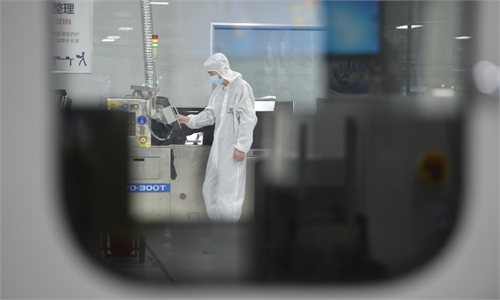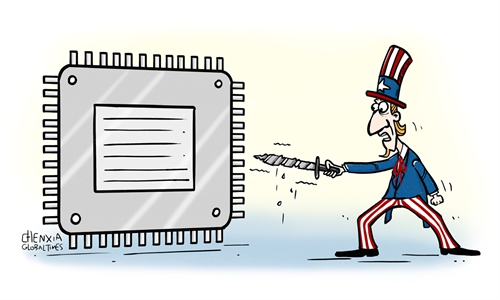
A chip manufacture machine Photo: VCG
The China Semiconductor Industry Association (CSIA) on Wednesday blasted reported expansions of chip trade restrictions by the US, as Washington's drive to curb supplies of high-tech components to China raises widespread concern among industry players.
The CSIA said in a statement that the reckless US plan will harm the interests of global consumers, jeopardize the competitiveness of the US semiconductor industry and threaten the globalization of the industry.
Recently, there have been reports suggesting that the Biden administration plans to tighten export controls on the sale of certain artificial intelligence chips to China.
The CSIA said that, in the past few years, the US government has taken measures restricting trade and disrupting the stability of the global semiconductor supply chain. As a consequence, the interests of global consumers are damaged, the competitiveness of the US semiconductor industry jeopardized, and the globalization of the semiconductor industry severely threatened.
"These moves generated growing concerns around the world," the CSIA said.
Following a US-led drive to deny China access to high-tech components, the Dutch government in June introduced new restrictions on chip-making equipment exports. The rule requires companies producing advanced chipmaking equipment to obtain a license before exporting it. The rules are set to take effect on September 1.
ASML CEO Peter Wennink said in an interview recently that he does not expect the export controls to significantly impact the company's business in 2023. He added a comprehensive analysis of the impact would depend on the release of the US rules.
The concern is shared among major US chip-makers. Recently, major US chip companies have urged the Biden administration to refrain from imposing further restrictions on chip exports to China in order to protect their profits in the world's largest market for chips.
The US-based Semiconductor Industry Association has issued a statement, urging the Biden administration to "refrain from further restrictions until it engages more extensively with industry and experts to assess the impact of current and potential restrictions."
China represents an enormous market. Wennink from ASML said that the demand for deep ultraviolet (DUV) lithography systems has been influenced by macroeconomic factors, and over the past two years, the Chinese market has absorbed some of the declining demand in other markets.
"The existence of such a market supports the development of the global supply of electronic and information products over the years… Any damage to the current global supply chain could create inevitable and irreparable harm to the global economy," the statement said.
The CSIA has pledged to work with "all countries and regions willing to collaborate with our industry to safeguard the globalization of the semiconductor industry", while facilitate international cooperation in the sector.


